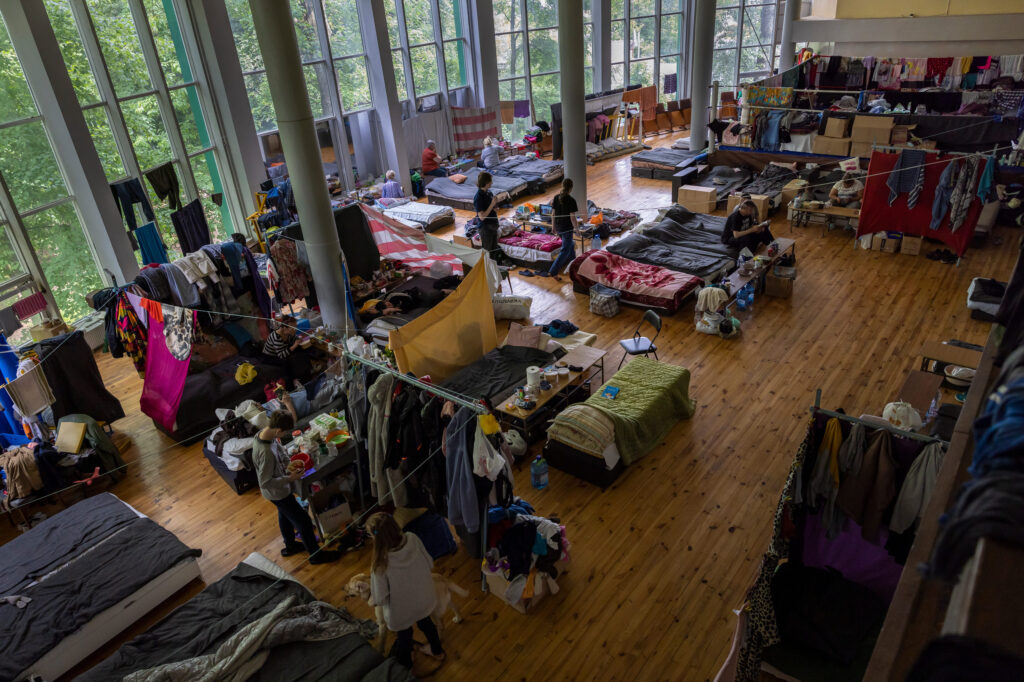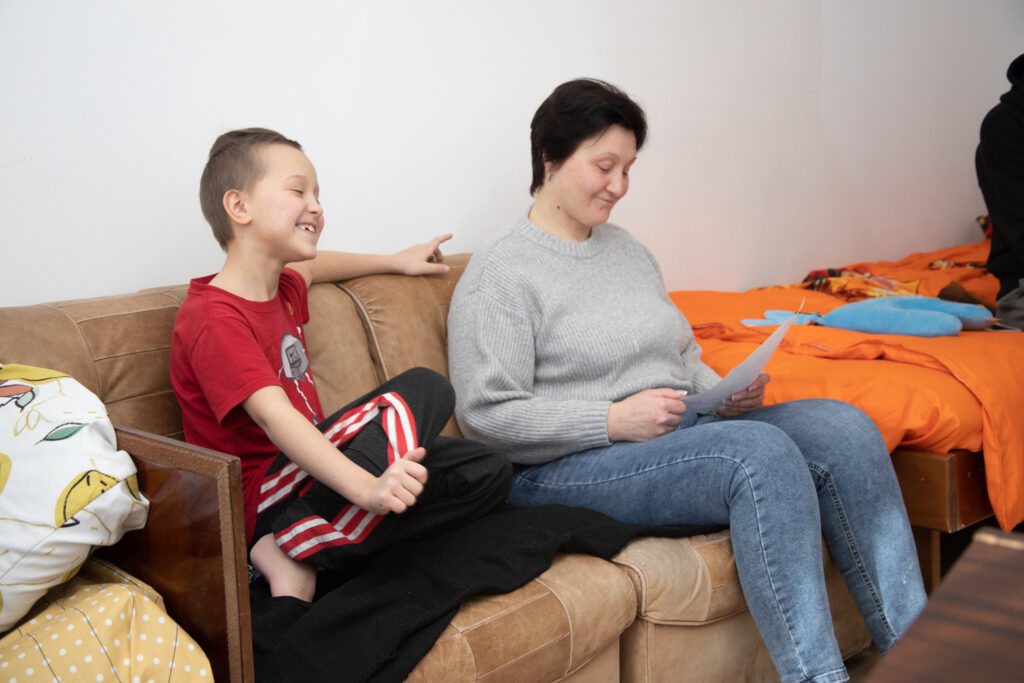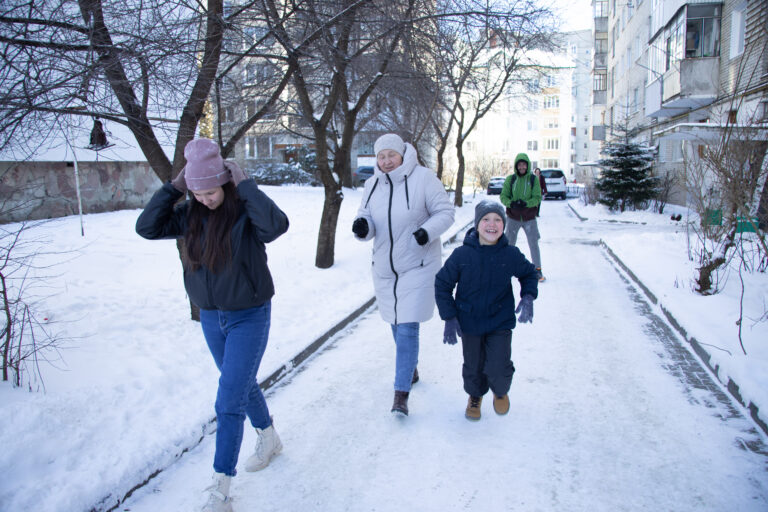HIGHLIGHTS
GET TO KNOW US
GET INVOLVED
MEDIA

REGIONS
California, Georgia, Chicago, North Carolina, New Orleans, Puerto Rico, Kentucky, Navajo Nation, Washington, D.C., Hawaii
INTERNATIONAL
A Ukrainian Family’s Story of
Survival and Strength
For six months, Liubov heard the explosions, some far off, some close enough to rattle her windows and cause her dishes to shake.
Since the early days of the war, her small village of Korobky had been under Russian occupation. Ukrainian forces were battling for liberation and the fighting seemed endless. For Liubov, her husband, and her three children, Nazar, Maksym, and Anastasiia, the situation felt dire, and they questioned whether to flee or stay in the safety of their home.
“When you hear explosions again and again, you start to wonder if it’s even worth it for you and your family to stay,” Liubov said.
But then, where could the family go? What could they do when she got there? With their three children in tow, they would need a safe place to stay. While Liubov and her husband questioned the right decision, the war made one for them when a loud explosion went off nearby, shaking the house. The family sprinted into the interior corridor of their home, desperate to get away from the windows, doors, and glass.
“My youngest son said to me, ‘Mother, I want to live. I don’t want to die.’ After hearing him say this, I began to think that we have no choice — we must leave,” Liubov said.
With that, the family fled their home and relocated over a thousand kilometers away, outside of the occupied territory, to the western Ukrainian town of Lviv. There, Liubov and her three children luckily found a place to stay at Lviv Polytechnic University, which had been converted into a shelter, one of many created for the more than 400,000 internally displaced individuals who had fled to the city.

IDP shelter at Lviv Polytechnic University. CORE Photo by Liam Storrings.
“We wanted to move but finding housing ourselves seemed impossible.”
Beds had been set up all over the campus, including in the university’s classrooms and sports venues. Liubov and her family ended up living in the school’s large gymnasium. Liubov, of course, felt grateful to have a roof over her family’s heads, but with so many people looking for support, the situation was very challenging. Conditions were tight and often cold, and Liubov felt constantly on edge trying to keep her children safe. And her kids had a tough time feeling like they had any space to themselves.
“At first, I even liked to be among people so as not to immerse myself in my problems. But over time, you start to get tired of not having personal space, your own place,” Liubov said.
And when the children started attending local schools, the issue got even worse. Liubov said her 17-year-old daughter had the most challenging experience in the shelter.
“She couldn’t find a place for herself, she couldn’t focus…It was difficult for children to study because of constant problems with the internet, and it was also difficult to concentrate,” Liubov said.
Liubov knew the family needed to find another place to stay, but she saw their options as limited.
“We wanted to move but finding housing ourselves seemed impossible,” Liubov said.
Then, she found CORE (Community Organized Relief Effort). Through an assistance program for internally displaced people supported by CORE and the Ukraine Humanitarian Fund (UHF), Liubov and her family received financial assistance for six months to rent an apartment, pay utility bills, receive realtor services, and cover necessities. It was just what the family needed during this stressful time.
"Now, we are beginning to understand that it is unlikely we will be able to return home soon."

Liubov and her son sitting inside of their new flat in Lviv. CORE Photo by Marchenko Nadiia.
“I am very happy. I think we are very lucky. A private flat is something that feels more like home. When you have an apartment, you can organize your life, you belong to yourself, and you can start making some plans,” Liubov said.
The children now have a place for themselves, and Liubov now has more time because she doesn’t need to watch over them constantly.
“They can do things more independently now. They can study normally: there is working Wi-Fi and space for this. It is not cold anymore,” Liubov said.
Now, in this stable place, surrounded by her family, Liubov can take a moment to catch her breath and fully comprehend the gravity of her family’s circumstances.

Liubov and her children, now with a place to call their own, are finding moments of joy while staying in Lviv. Seen here, outside playing in the snow. CORE Photo by Marchenko Nadiia.
“It probably took us almost a year to realize what happened. Now, we are beginning to understand that it is unlikely we will be able to return home soon. After the move, we now belong to ourselves again and can plan our lives further,” she shared.
Liubov’s family is among 162 internally displaced people who have established temporary housing away from their homes thanks to CORE and UHF’s partnership program. As this war enters its third year, CORE continues to help thousands escaping the fighting, like Liubov, by facilitating stays at collective centers and other shelter support programs in Ukraine and the region.
Please donate to support CORE’s ongoing relief efforts in Ukraine and beyond.
HIGHLIGHTS
GET TO KNOW US
GET INVOLVED
MEDIA

REGIONS
California, Georgia, Chicago, North Carolina, New Orleans, Puerto Rico, Kentucky, Navajo Nation, Washington, D.C., Hawaii
INTERNATIONAL

CORE is a charitable 501(c)(3) nonprofit organization. Federal tax ID: 27-1703237.
© 2024 | CORE – Community Organized Relief Effort | +1 (323) 934 4400
910 N Hill St Los Angeles, CA 90012